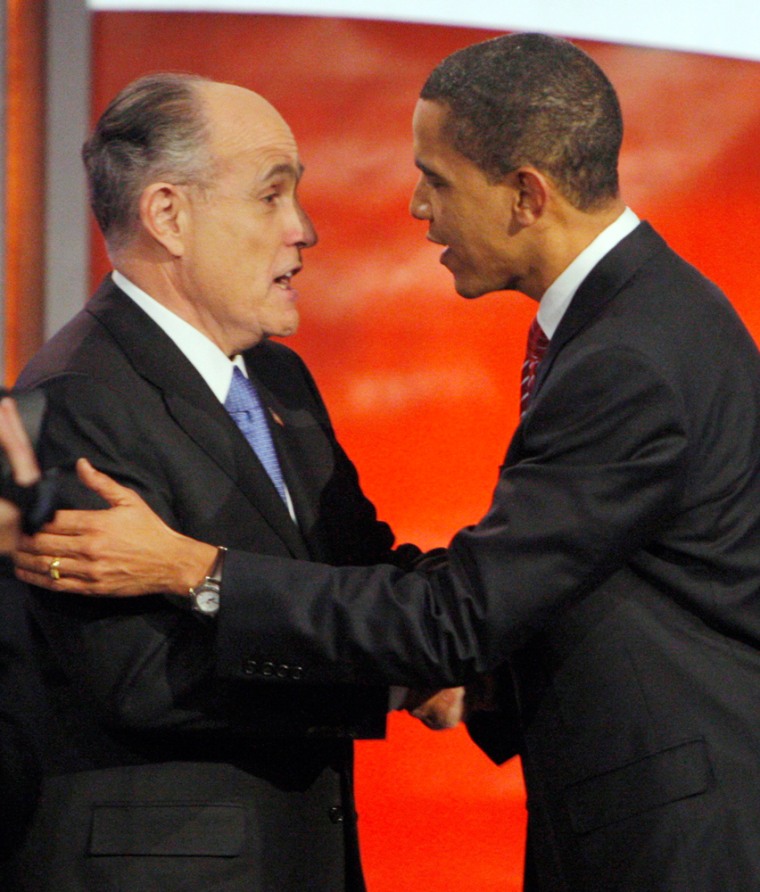Did you know that Republican Rudy Giuliani beat Democrat Barack Obama in Pennsylvania in the presidential election? He got 52 percent of the vote compared to Obama’s 32 percent.
Well, OK, it wasn't the actual election. That comes in November.
Giuliani’s landslide victory in the state, which hasn’t gone Republican since 1988, was actually a survey win, one conducted last year by the respected polling organization at Franklin & Marshall College.
The polling suggested that Giuliani could remake the electoral map and win such states as Pennsylvania and California that usually go Democratic.
Well, that was when he was still the race.
Now the Obama and Clinton campaigns are using similarly speculative data in an attempt to persuade Democratic primary voters that their candidate can also carry key states in the general election.
'08 predictions
Who is more likely to win Iowa on Nov. 4?
The Obama campaign would like you to know, especially if you’re a superdelegate or a primary voter in Texas, Vermont, Ohio or Rhode Island next Tuesday, that if the Illinois senator were the Democratic nominee in November, he’d defeat Sen. John McCain in Iowa, winning 53 percent to 36 percent.
This, at least according to a Des Moines Register survey of 674 Iowans last week.
But, if primary voters (and those superdelegates) choose Sen. Hillary Clinton as the Democratic nominee, that same poll paints a grim picture for the party.
Iowa would go for McCain, 49 percent to Clinton’s 40 percent.
Iowa is vitally important because it is a state President George W. Bush lost by only 4,000 votes in 2000, but won in the 2004 election, edging Democrat John Kerry by seven-tenths of one percent.
Who will carry New Mexico?
The Obama camp is also reminding voters to remember New Mexico.
It's a state that had the closest vote of all in 2004, with Bush winning by fewer that 6,000 votes out of more than 756,000 total votes cast.
Last week, a Rasmussen Reports survey of 500 New Mexicans found that likely voters are split evenly among Obama and McCain, each candidate tied at 44 percent.
Rasmussen also found that Clinton would lose New Mexico to McCain by 12 percentage points.
Bill Clinton won New Mexico twice and Al Gore carried the state in 2000 by seven percentage points.
But Harold Ickes, a strategist for Clinton, cites her victories in primaries in New Mexico and other battleground states as evidence of her electability in November.
"Look at what Hillary has won,” Ickes told reporters recently. “She has won New Mexico, she’s won Arizona, she’s won Nevada, she’s won Tennessee. Those are key swing states that we need to win, at least some of them, if we are going 270 electoral votes.”
But what kind of value should be placed on hypothetical polling numbers and primary election results ahead of a general election?
Are they junk food data? Empty campaign prediction calories?
Ask Gen. Wesley Clark, the man who could have, would have (almost) beat Bush in 2004. Or more specifically, a poll published about him in September of 2003.
In a hypothetical election against Bush, 43 percent of registered voters said they would vote for Clark or were leaning toward voting for him, compared to 47 percent who'd vote for or were leaning toward Bush.
It was exhilarating statistical tie for Clark (once you factor in the margin of error), a man who until that point had never run for any elective office.
By comparison, then-Democratic frontrunner Howard Dean would have lost to Bush by 14 points, the poll showed.
Clark could beat Bush in November 2004, the data said, Dean couldn’t.
The argument has long been a mantra of presidential hopefuls: “Please believe me: (even though there’s no way to prove it) I can beat the other party’s candidate in November.”
'Alexander beats Clinton'
In 1996, former Republican Gov. Lamar Alexander of Tennessee trekked all over Iowa repeating the slogan “Remember your ABCs, Alexander beats Clinton.”
Alexander said that as someone from outside Washington he’d be a tougher opponent for President Bill Clinton than would Senate Majority Leader Bob Dole, an old Washington insider.
“President Clinton is already running against the Republican Congress,” Alexander told voters early in 1996. He pointed to — what else? — polling data showing Dole trailing Clinton by 19 points.
Dole ended up winning the GOP nomination, but losing to Clinton in an electoral vote landslide. It's impossible to know whether Alexander would have done any better, although he was the GOP contender whom Clinton and Gore most feared in 1996, according to former Clinton pollster Dick Morris.
After the two parties choose their nominees this summer, and once we’re within weeks of Nov. 4, strategists will (of course) use polling data on Iowa, New Mexico, and other contested states to decide where to buy TV ads and where their candidates should campaign.
But for the moment, we'll be seeing a lot of speculative data. If poll respondents today can tell us who will win Iowa or New Mexico on Nov. 4, perhaps they could also tell us the answers to these questions:
- What will be the price of gasoline at the pump on Nov. 4?
- What will the unemployment rate be on Nov. 4?
- What would be the number of casualties in a Chinese attack on Taiwan prior to Nov. 4?
- What would be the explosive power in megatons of a nuclear warhead that Iran tested prior to Nov. 4? What would reaction be in the Islamic world if Israel pre-emptively attacked Iran's nuclear development sites prior to Nov. 4?
- What blunders will each of the candidates commit in the seven months between now and Election Day?
